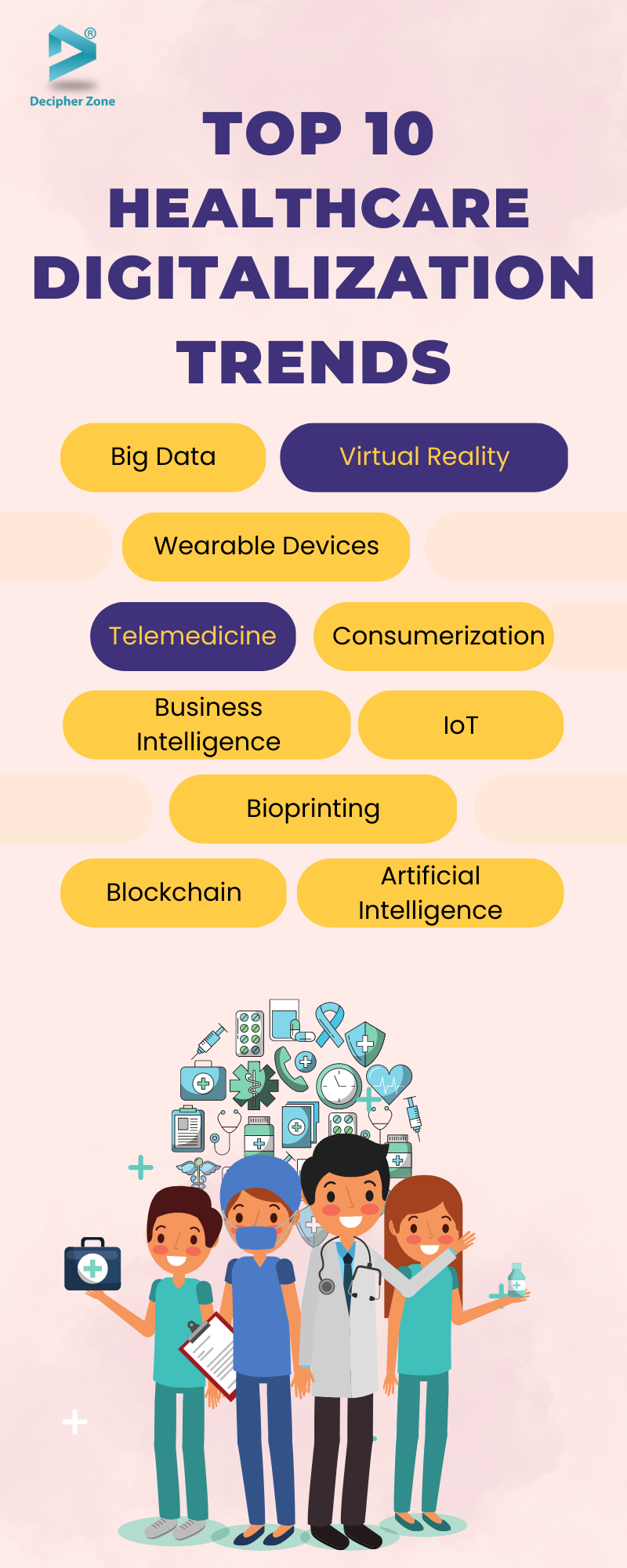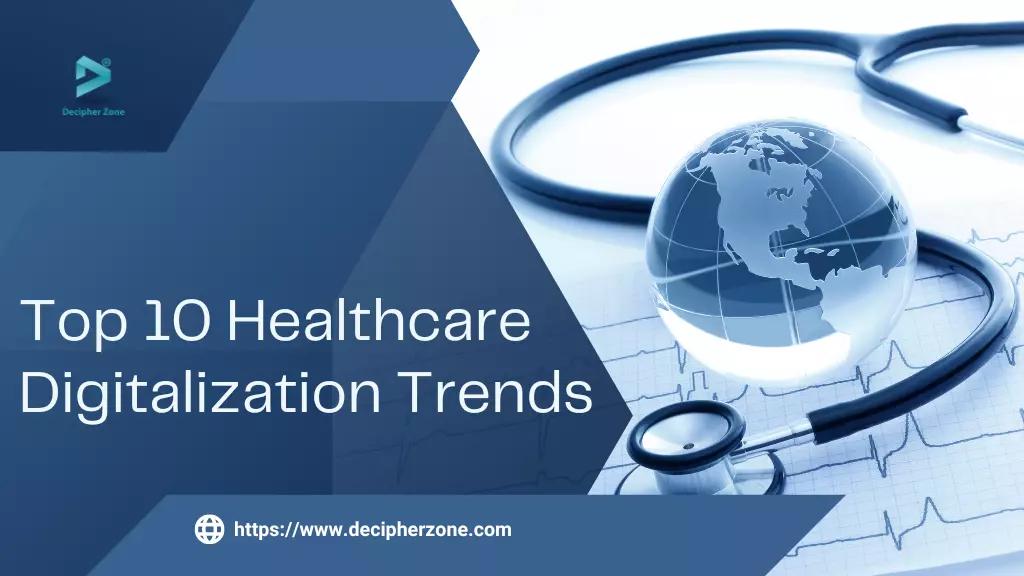Top 10 trends in US healthcare digitalization industry in 2023. Healthcare digitization is happening right in front of our eyes. The healthcare industry is reforming its strategies to keep up with the continuously evolving technology.
If we look into the stats shared by Globe Newswire, the global digital healthcare market size is about to grow at a CAGR of 16.1% from 2022-2030 and surpass $195.1 Billion.
Technologies like AI, Big Data, Virtual Reality, Wearable devices, etc. will be some of the backbones of the healthcare industry's digitalization.
These technologies will help healthcare providers streamline treatment processes, reduce human errors, remotely monitor patients, improve medical record management, and minimize costs through integrated mobile and web experiences.
But what are the top digital trends in healthcare that you must know about?
Top 10 Healthcare Digitalization Trends to be Consider in 2023
To help you, we have curated a list of the top 10 Digitalization trends in US healthcare industry to watch in 2023.
-
Big Data in Healthcare Management
-
Virtual Reality in Medical Training and Care Model
-
Wearables, Digital Sensors, and Biotelemetry
-
Rise in Telemedicine
-
Business Intelligence
-
Consumerization of Healthcare
-
IoT in Medicine
-
Organ Care Technology and Bioprinting
-
Blockchain for Better Electronic Health Records
-
Artificial Intelligence
Digitalization in healthcare encompasses everything from booking an appointment, doctor-patient consultation, disease diagnosis, patient monitoring, and record management.
Read: Healthcare App Development Services
With new technology emerging in the market to shape the healthcare industry's future, we will discuss the top healthcare trends you can expect and adopt to succeed.
Big Data in Healthcare Management
Big data refers to large and complex data sets (both structured and unstructured data) that can’t be dealt with using traditional data-processing techniques. The big data is processed using machine learning algorithms with the help of data scientists.
Read: Java For Data Science
In healthcare, Big Data includes data collected from financial transactions, online patient records, appointment data, clinical data, and more. Big data in healthcare helps in collecting, processing, analyzing, reporting, and leveraging these complex data sets that cannot be understood using traditional data management.
Some of the benefits that come with using big data in healthcare are:
-
Simplified Preventive Care
-
Reduced Medication Errors
-
Better Staffing
-
Real-Time Care
-
On-Time Follow-Ups
-
Cost Reduction
-
Informed Treatments and Diagnosis Decisions
Virtual Reality in Medical Training and Care Model
Virtual Reality refers to the stimulation and modeling of objects and scenes that give an immersive feel of the virtual world to the users. Therefore, implementing virtual reality in the healthcare industry can open better opportunities for healthcare professionals.
Some of the advantages of Healthcare Virtual Reality are:
-
Enhanced Medical Training
-
Improved Medical Diagnosis
-
Patient Education
-
Robotic Surgery
-
Better Medical Treatments
-
Better Access to Remote Areas
Wearables, Digital Sensors, and Biotelemetry
Wearable devices are thriving in the healthcare industry. The digital sensors in wearable devices have made ECGs, Glucose Levels, BP monitoring, and blood oxygen levels diagnosis readily accessible. Wearables help patients to monitor their progress and provide measures for health control.
Read: Healthcare Consulting Services and Solutions
On the other hand, biotelemetry helps in collecting data through the digital sensors to keep track of vital signs including variability of heart rate throughout the day. Using biotelemetry helps patients and healthcare providers to take proactive measures for improving patients' health. Also, researchers can use health trends to study and analyze health trends for a group of people.
Oximeters, sweat meters, exercise trackers, and heart rate sensors are some of the widely used wearable devices that you might have seen.
The benefits of wearable devices are:
-
Personalized Experience
-
Promote Proactive Healthcare
-
Reduce Healthcare Costs
-
Decrease staff workload
-
Increases Patients Engagement
Rise in Telemedicine
Telemedicine refers to the act of providing remote clinical services through real-time communication between healthcare providers and patients. It has been regarded as an ideal way to treat and manage chronic diseases. Telemedicine has helped surpass the geographical gap between doctors and patients while saving time and money.
A few benefits of telemedicine in healthcare are:
-
Easy Access to Specialists
-
Better Medical Access to Rural Areas
-
No Transportation Costs
-
Better Appointment Schedule Flexibility
Business Intelligence
BI refers to the analysis of data to deliver actionable insights using tech-driven processes to allow businesses to make informed decisions. Implementing business intelligence in the healthcare industry can help in collecting, storing, processing, and analyzing patients' data to gain valuable insights and enhance treatments, improve patients care, and enhance research.
Consumerization of Healthcare
The demand for personalized and proactive healthcare experiences is tremendously growing. That being said, digital communication with healthcare professionals has also seen growth over the years. Hence, rather than focusing on the healthcare market as a whole with consumerization, the healthcare industry is focused on individual patients.
Consumerization of healthcare will support:
-
The Blend of Traditional and Digital Treatment
-
The Explosion of Hybrid Healthcare approaches
-
Automating Healthcare Operations

IoT in Medicine
IoT-enabled devices have allowed healthcare providers to monitor their patients to keep them safe and healthy. Undoubtedly, IoT is another important trend in the healthcare industry that benefits hospitals, physicians, insurance companies, and most importantly patients.
Read: On-demand Medicine Delivery App Development
A few advantages that IoT in medicine can provide are:
-
Helps physicians keep track of patient’s health
-
IoT-embedded devices with sensors help track the real-time location of wheelchairs, oxygen pumps, defibrillators, nebulizers, etc. in the hospital.
-
By capturing data through health monitoring devices, insurance companies can detect fraud claims and risk assessments.
Organ Care Technology and Bioprinting
One of the trends we are about to witness in the healthcare industry is Organ Care Tech and Bioprinting. Transmedics developed an organ system to keep the body organs outside of the body for several hours to be used in transplantations.
Perhaps what is most important is that machine learning might be able to identify whether an organ can be preserved for transplantation.
Read: Digital Transformation in the Healthcare Industry
Apart from keeping the organs outside the body alive, bioprinting is yet another trend we might encounter sooner than imagined. Bioprinting is going to involve the 3D printing of organs based on the recipient's body characteristics to be compatible with the host.
Blockchain for Better Electronic Health Records
As we know blockchain is the digital, decentralized, shared, immutable ledger that records transactions and tracks assets within a network.
Implementing blockchain in the healthcare industry can help prove to be an effective solution for overcoming data breaches, cutting costs, and enhancing medical records accuracy.
Some of the advantages that blockchain offers in the healthcare marketplace are:
-
Patient-Centric EHR
-
Better Data Management and Sharing
-
Improved Drug Traceability
-
Innovative Healthcare Model
Artificial Intelligence
The emergence of AI in healthcare has been transforming the way we treat, diagnose, and monitor patients. AI will be the most helpful technology in the market to forecast outbreaks and aid drug discovery.
Some of the popular advantages that Artificial Intelligence will offer to the healthcare industry are:
-
Helps in identifying mental health problems based on severe symptoms.
-
Can improve the WSI (Whole Slide Imaging) analysis.
-
It can also improve medical areas like drug discovery, genomics, and precision medicine.
Future of US Healthcare Industry
These digital trends in the Healthcare industry offer a promising future when it comes to personalizing and advancing medical care for patients.
Read: Healthcare Technology
So that was all about healthcare digital trends and we hope that you found the article helpful.
If you too want to leverage these technologies for your business, then get in touch with our experts to get a customized quote now!
FAQs
What are some new trends in healthcare?
Big Data, Virtual Reality, Wearable Devices, Telemedicine, Business Intelligence, Consumerization, IoT, Bioprinting, Blockchain, and AI are the top 10 trends that we will witness in the healthcare industry.
What is the common focus of modern healthcare trends?
The common focus of modern healthcare trends is to streamline treatment processes, reduce human errors, remotely monitor patients, improve medical record management, and minimize cost through integrated mobile and web experiences.
How is digitalization transforming healthcare?
Digital tools and technologies in healthcare help health providers get a holistic patient health view through collected data and allow them to improve treatment results and efficiency.

